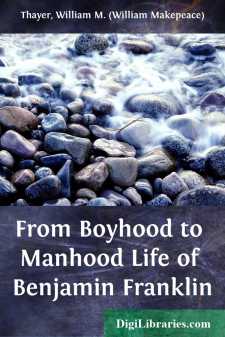Categories
- Antiques & Collectibles 13
- Architecture 36
- Art 48
- Bibles 22
- Biography & Autobiography 813
- Body, Mind & Spirit 142
- Business & Economics 28
- Children's Books 17
- Children's Fiction 14
- Computers 4
- Cooking 94
- Crafts & Hobbies 4
- Drama 346
- Education 46
- Family & Relationships 57
- Fiction 11829
- Games 19
- Gardening 17
- Health & Fitness 34
- History 1377
- House & Home 1
- Humor 147
- Juvenile Fiction 1873
- Juvenile Nonfiction 202
- Language Arts & Disciplines 88
- Law 16
- Literary Collections 686
- Literary Criticism 179
- Mathematics 13
- Medical 41
- Music 40
- Nature 179
- Non-Classifiable 1768
- Performing Arts 7
- Periodicals 1453
- Philosophy 64
- Photography 2
- Poetry 896
- Political Science 203
- Psychology 42
- Reference 154
- Religion 513
- Science 126
- Self-Help 84
- Social Science 81
- Sports & Recreation 34
- Study Aids 3
- Technology & Engineering 59
- Transportation 23
- Travel 463
- True Crime 29
William M. (William Makepeace) Thayer
William Makepeace Thayer was a 19th-century American author known for his biographical works and moralistic children's literature. He wrote extensively on the lives of prominent figures, aiming to inspire young readers with tales of character and perseverance. Among his most notable works are "The Poor Boy and Merchant Prince" and "From Log-Cabin to White House," the latter being a biography of Abraham Lincoln. Thayer's writings often emphasized Christian values and the importance of self-improvement.
Author's Books:
Sort by:
CHAPTER I. THE WHISTLE. It was a bright, welcome holiday to little Benjamin Franklin, when his kind parents put some coppers into his pocket, to spend as he saw fit. Possibly it was the first time he was ever permitted to go out alone into the streets of Boston with money to spend for his own pleasure; for he was now but seven years old. "Can I have more coppers when these are gone?" he...
more...
BOYHOOD TO MANHOOD. I. FROM OLD ENGLAND TO NEW ENGLAND. "I am tired of so much persecution under the reign of our corrupt king," said a neighbor to Josiah Franklin, one day in the year 1685, in the usually quiet village of Banbury, England, "and I believe that I shall pull up stakes and emigrate to Boston. That is the most thriving port in America." "Well, I am not quite prepared...
more...
CHAPTER I. A GOOD BEGINNING. A little patch of ground enclosed by a fence, a few adjacent trees, Nat with his hoe in hand, his father giving directions, on one of the brightest May mornings that was ever greeted by the carol of birds, are the scenes that open to our view. "There, Nat, if you plant and hoe your squashes with care, you will raise a nice parcel of them on this piece of ground. It is...
more...




